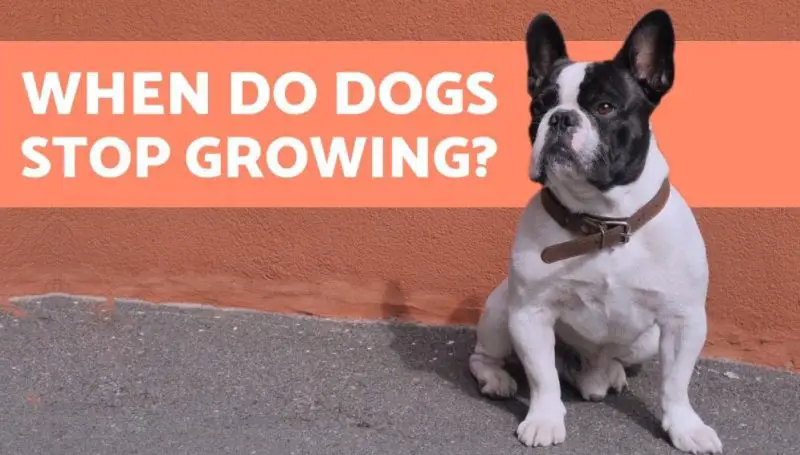Bringing a new puppy into your home is an exciting experience. As a new dog parent, you’ll likely wonder when your furry friend will stop growing. Understanding the stages of puppy development is crucial to ensuring that you meet all their needs during this time.
In this guide, we will answer the question “When do puppies stop growing?” in detail, while providing insights into the various growth stages of puppies, how to care for them, and what to expect.
Understanding Puppy Growth: Why It’s Important to Know When They Stop Growing

Puppies go through different developmental phases as they grow, and each phase is important for their physical and emotional well-being. Knowing when your puppy will stop growing helps you manage their nutrition, exercise, and healthcare needs. Growth is not just about size—it also influences their behavior, energy levels, and even how they interact with you and your family.
As a responsible pet owner, it’s essential to understand how long your puppy will be growing, when they’ll reach their full size, and how to provide them with the best care during this time.
What Are the Stages of Puppy Growth?
Puppies grow quickly in the first few months of their life, but their growth rate slows down as they approach adulthood. Understanding these stages can help you identify when your puppy will stop growing and how to care for them at each stage.
1. Neonatal Stage (0-2 Weeks)
The neonatal stage is the first two weeks of a puppy’s life. During this time, puppies are entirely dependent on their mother for food, warmth, and care. They are born with their eyes and ears closed, and they can’t hear or see yet. At this stage, puppies are growing at an impressive rate, typically doubling their weight during the first week of life.
2. Transitional Stage (2-4 Weeks)
The transitional stage begins when the puppy starts to open its eyes and ears. Puppies begin to explore their surroundings, though they are still dependent on their mother for nourishment. They will also start to develop their sense of sight, smell, and hearing. This stage marks the beginning of social interaction with littermates and humans.
3. Socialization Stage (4-12 Weeks)
The socialization stage is critical for a puppy’s development. Puppies learn how to interact with people, other animals, and their environment. During this period, they begin to explore more actively and start to eat solid food. They will also undergo their first vaccinations and vet check-ups.
4. Juvenile Stage (3-6 Months)
During the juvenile stage, puppies experience a rapid growth spurt. They will be much more energetic and curious. This is also when they start teething, and their baby teeth begin to fall out. By 6 months, many puppies will have reached about half of their adult size.
5. Adolescent Stage (6-12 Months)
At this stage, your puppy will start to look more like an adult dog, though they still have some growing to do. Many puppies reach their full height by 9 to 12 months, but their muscles and body mass continue to develop until they are about 18 months old.
6. Adult Stage (1-2 Years)
At 1 year old, most puppies will have reached their full height. However, the growth in terms of weight and muscle mass continues until they are around 18 to 24 months, depending on the breed. Small breeds tend to stop growing earlier, while large breeds may take longer to reach full maturity.
When Do Puppies Stop Growing? The Answer Based on Their Breed
The age at which puppies stop growing largely depends on their breed and size. While smaller breeds may stop growing at around 9-12 months, larger breeds can continue to grow for up to 18 months or longer.
Small Breeds (1-20 lbs)
Small dog breeds like Chihuahuas, Pomeranians, and Dachshunds typically stop growing by 9 to 12 months. They reach their adult size relatively quickly compared to larger breeds. At this age, they will have fully developed their bones, muscles, and organs, making them fully mature.
Medium Breeds (21-50 lbs)
Medium-sized breeds like Beagles, Cocker Spaniels, and Bulldogs usually stop growing between 12 and 15 months. These dogs will have reached their full height, but they may still gain some weight and muscle mass as they mature.
Large Breeds (51-100 lbs)
Large dog breeds like Golden Retrievers, Labrador Retrievers, and Boxers generally stop growing between 15 and 18 months. These dogs will continue to fill out and develop muscle mass after reaching their full height.
Giant Breeds (Over 100 lbs)
Giant breeds, including Great Danes, Mastiffs, and Saint Bernards, take the longest to stop growing. They may continue to grow until they are 18 to 24 months old. These dogs can have a more gradual growth process, and it’s essential to monitor their diet and exercise to prevent issues like hip dysplasia.
Factors That Influence When a Puppy Stops Growing
Several factors play a role in determining when your puppy will stop growing. These factors include genetics, diet, exercise, and overall health. Let’s take a closer look at each of these.
1. Genetics and Breed
As mentioned earlier, genetics is a significant factor in determining how fast and how long a puppy will grow. Larger breeds tend to grow for longer periods, while smaller breeds reach their adult size more quickly. A puppy’s parents and their growth rates can offer clues about how long your puppy will continue to grow.
2. Nutrition and Diet
A well-balanced diet is crucial for healthy growth. Puppies need specific nutrients, including protein, fat, vitamins, and minerals, to support their development. Poor nutrition can lead to stunted growth or other health issues. It’s important to feed your puppy food formulated for their age and size.
3. Exercise and Physical Activity
Moderate exercise is important to encourage muscle development and overall health. However, excessive exercise or heavy lifting during the early stages of growth can cause joint and bone issues, particularly in large breed puppies. Always follow your veterinarian’s recommendations for exercise to avoid overexertion.
4. Health and Vet Visits
Regular vet visits are essential for monitoring your puppy’s growth and development. Your vet can ensure that your puppy is on track to meet their growth milestones and help you address any health concerns. Conditions like hypothyroidism, growth hormone deficiencies, and joint problems can affect your puppy’s growth.
What to Expect After Your Puppy Stops Growing
Once your puppy has reached their adult size, they will enter the adult phase of life. This stage is characterized by:
- Behavioral Changes: As they mature, your puppy’s energy levels may stabilize. They may calm down and become less hyperactive.
- Nutritional Needs: Adult dogs have different nutritional needs than puppies. They typically require fewer calories but more fiber and protein for muscle maintenance.
- Health Care: Regular health check-ups, vaccinations, and dental care will still be necessary to maintain your dog’s well-being.
- Exercise: As your dog matures, they may need less exercise than they did as a puppy, but it’s still important to maintain regular physical activity.
Conclusion: When Do Puppies Stop Growing?
In conclusion, the age at which puppies stop growing depends largely on their breed and size. Small breeds typically stop growing at 9-12 months, medium breeds around 12-15 months, and large or giant breeds may continue growing for up to 18-24 months. By understanding your puppy’s growth stages, you can provide the right care and ensure they grow into healthy, happy adult dogs.
Remember, each puppy is unique, and it’s essential to monitor their development closely. If you ever have concerns about your puppy’s growth, be sure to consult with your veterinarian. With proper care, your puppy will grow into a well-adjusted adult dog, ready to bring joy and companionship to your life for many years to come.






